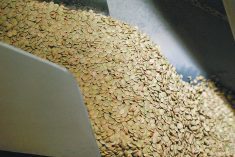Saskatchewan farmers want the provincial and federal governments to make a deal to save the port of Churchill because is too strategic to ignore, say farm and rural leaders.
“If we lose this opportunity, I’d be worried,” said Neal Hardy, president of the Saskatchewan Association of Rural Municipalities.
“There’s an opportunity to come in, to save our producers money and give us a better overall return.”
The port of Churchill advisory board recently issued a public plea to governments and the grain industry to make more use of the port or lose it. Vice-chair Lloyd Axworthy said the port has been staggered by two years of low grain volumes and would be seriously damaged by a third.
Read Also

Canola support gets mixed response
A series of canola industry support measures announced by the federal government are being met with mixed reviews.
He also said the port needs more prairie grain and products. The Canadian Wheat Board is a major user, but non-board grain rarely flows through it.
Terry Hildebrandt, head of the Agricultural Producers Association of Saskatchewan, said Churchill saves eastern Saskatchewan farmers money, and they can’t afford to lose it.
“Farmers are always looking for as much advantage as they can find,” he said.
“The port of Churchill offers that to farmers.”
Hardy and Hildebrandt said the wheat board needs to make sure that Churchill receives its fair share of board shipments.
“The Canadian Wheat Board has to be encouraged, and we’ve been encouraging them over the last two months to make use of that port,” Hardy said.
Saskatchewan transportation minister Mark Wortman said Churchill “is important to us” and wants the federal government to commit to saving the port.
“If everybody is on board, values the port and really sees its future potential, I think we’re going to make it through this,” he said.
“But it’s not going to be easy. They need the volumes of commodities moving through there.”
Wortman said the wheat board needs to treat the port as a strategic grain channel, but the port’s real saviour would probably be other grain and products that are not now exported through Churchill.
He said the federal government needs to ensure that transportation regulations don’t limit Churchill’s ability to attract business.
A federal commitment would be key to keeping Churchill viable, which may involve federal money.
“They would be wise to look favourably at putting more federal support into keeping Churchill going.”
Wortman was cautious about pushing the wheat board to use the port more than business conditions would demand.
“I’d want to see what the impact of that would be.”
The board’s mandate is to earn farmers’ the maximum return possible, he added.
“We want to see this be efficient, competitive and producers get the best deal they can get.”
Hardy said Saskatchewan farmers need to realize Churchill is their port. One way they could help would be to ship more producer cars through the port, he added.
“We say that at every convention, but I’m not sure they all understand that.”















